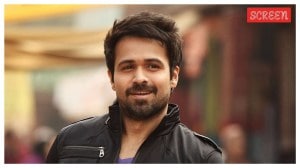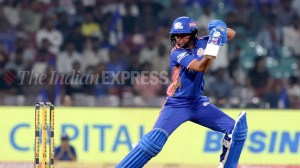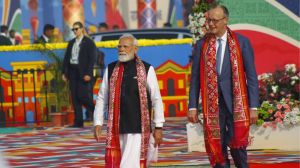In a make-believe world
I have known BJP president L.K. Advani from the days he was in journalism. I was then information officer at the Press Information Bureau of...

I have known BJP president L.K. Advani from the days he was in journalism. I was then information officer at the Press Information Bureau of the Government of India. He would come to my room, pick up the handout and leave quietly. His connections with the RSS were well-known even at that time. But then, he would be reluctant to discuss the Sangh, particularly when people linked it with the assassination of Mahatma Gandhi. He has now come out in the open.
Four decades on, he has not lost his evangelical fervour. He continues to wear Hindutva on his sleeve and raises the bar of extremism higher and higher. As he begins another stint as party president, Advani links the BJP with divinity. Whether this shores up the BJP8217;s sagging morale remains to be seen. But this is certainly a desperate shot in the dark. Otherwise, it is difficult to imagine how a leader could present in the 21st century, and that too in writing, a concept from the Middle Ages 8212; that a party representing Hindus has the divine right to lead the country. He has claimed proudly that 8216;8216;the BJP is really the chosen instrument of the divine8217;8217; to solve the country8217;s problems. When he talks about the BJP solving India8217;s problems, he does not realise that the party is part of the problem, not the solution. His speech, or outburst, at the BJP8217;s national executive committee meeting was no different. He stated that secularism or something similar would efface the Hindu ethos. Gujarat Chief Minister Narendra Modi, who was given a place on the dais almost next to Advani, is the person who defaced the Hindu ethos of pluralism when he blessed the killing and looting of Muslims in his state.
The manner in which Advani humiliated former Madhya Pradesh Chief Minister Uma Bharati in the name of discipline before the electronic media he had specially invited, showcased his dictator-like qualities. He wanted everyone to see his authority. How dare anyone tell him to his face that he pursues double standards, one for those who have no political base but placate him all the time and another for those who have the base but mince no words? It is a pity that former Prime Minister Atal Bihari Vajpayee has become Advani8217;s No 2. He could have brought about some balance in the party. Vajpayee seems a pathetic figure today who has lost faith in himself after losing power.
Advani8217;s 8216;8216;achievement8217;8217; is that he has brought the BJP back to square one 8212; dogmatic and demoralised. He joined the Janata Party in 1977 8212; a post-Emergency phenomenon 8212; only to destroy it from within and to place his chosen candidates in the ministry of information and broadcasting that he headed. It goes to his credit, or discredit, that he reassembled members of the erstwhile Jana Sangh after refusing to cut off links with the RSS and rebuilt another communal organisation, the BJP, which cleverly disguised its parochial fangs to head the National Democratic Alliance.
Before he became India8217;s home minister, Advani pretended to modesty but he soon gave up the effort. The office provided him the perfect setting. After becoming BJP chief again, he has given up another pretence: he does not want his party to be mistaken for anything other than an intractable body of chauvinistic Hindus.
Posterity will judge Advani as the person who did the greatest harm to Hinduism. He has tried to render it monolithic and parochial whereas its traditions are pluralistic and liberal. For dubious political gains, he has sought to mutilate the religion itself. He looked like he would succeed at one time. But the common man in India gave him a befitting reply by defeating the BJP in the Lok Sabha polls. That Advani has failed is a tribute to the maturity of the Hindu community which has clung for centuries to the basic understanding that India is a pluralistic society.
Recently, Advani had his party8217;s executive committee adopt a resolution backing the Ram Janambhoomi movement. He has often been known to compare his Rath Yatra with Mahatma Gandhi8217;s Salt March, notwithstanding the fact that he has been told several times, even in Parliament, that he compares the ridiculous with the sublime. He still shows no second thoughts on the trail of blood his yatra left in its wake in northern India. How far the Babri Masjid8217;s demolition was his doing is yet to be ascertained. But he did nominate to the National Human Rights Commission the CBI director who withdrew the case implicating him in the demolition.
Hinduism is Advani8217;s ideology, not merely his religion. He honestly believes that pluralistic India should be converted into a Hindu Rashtra. This should open the eyes of the constituents of the NDA. Some of Advani8217;s colleagues like Nitish Kumar and Sharad Yadav have said that the new face of the BJP is not acceptable to them. But this is not the moment to verify their statement because the BJP is nowhere near power at the Centre. And their past records have been so dismal that their secular credentials must surely remain a question mark.
Can these allies point to even a single step that they took to stall the BJP8217;s efforts to saffronise education, culture, information or other fields of governance? Some leaders like the Telugu Desam chief Chandrababu Naidu still hope that the Advani-type BJP will change. When a political party begins to live in a make-believe world, it becomes irrelevant. This is what is happening to the BJP. The more Advani talks about its divine right to rule, the more distant it becomes from the people. Mandir-like issues do not sell any more. India cannot be anything but a pluralistic society with different identities merging into a composite culture. The BJP too will realise this one day.
- 01
- 02
- 03
- 04
- 05































